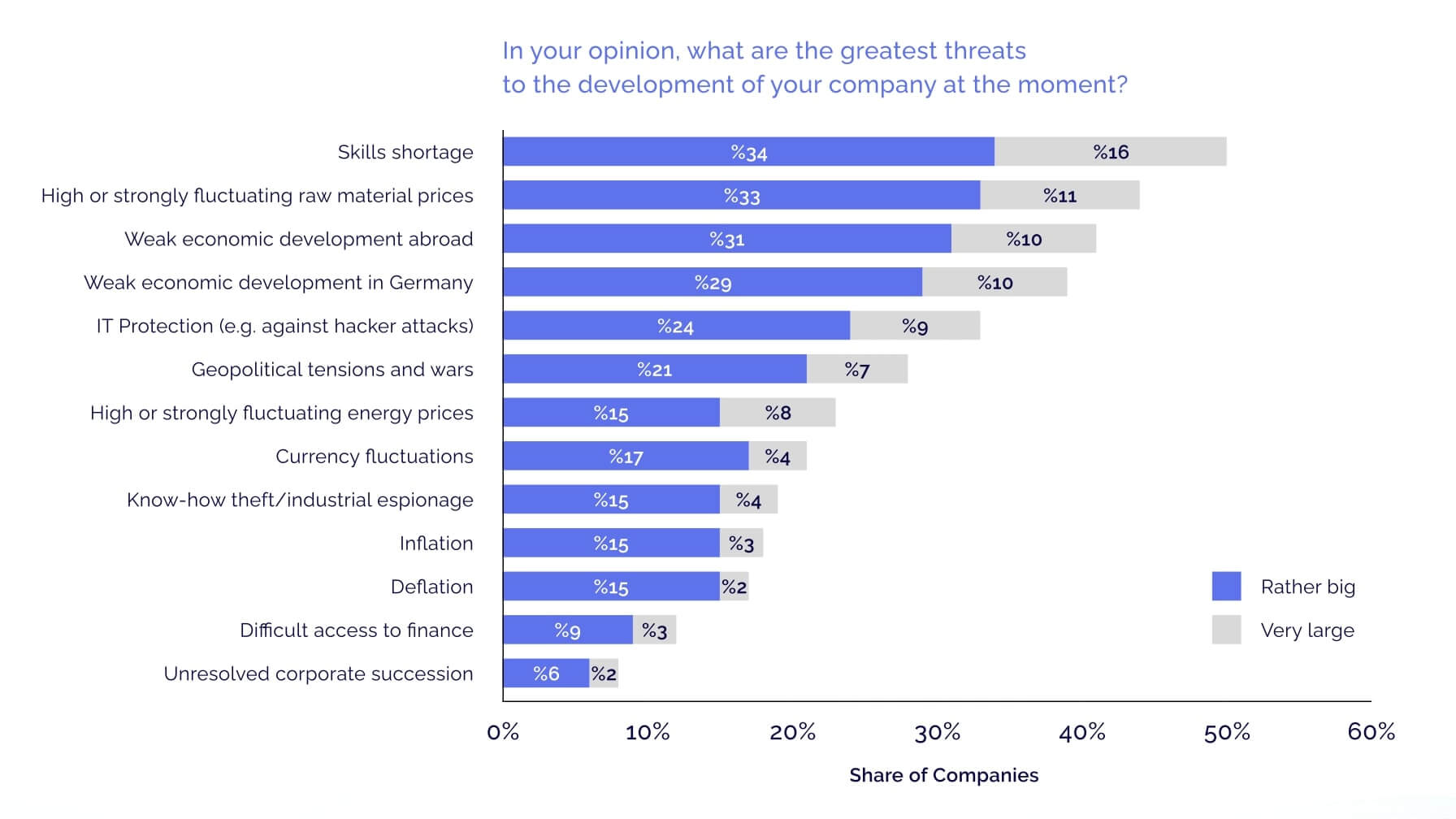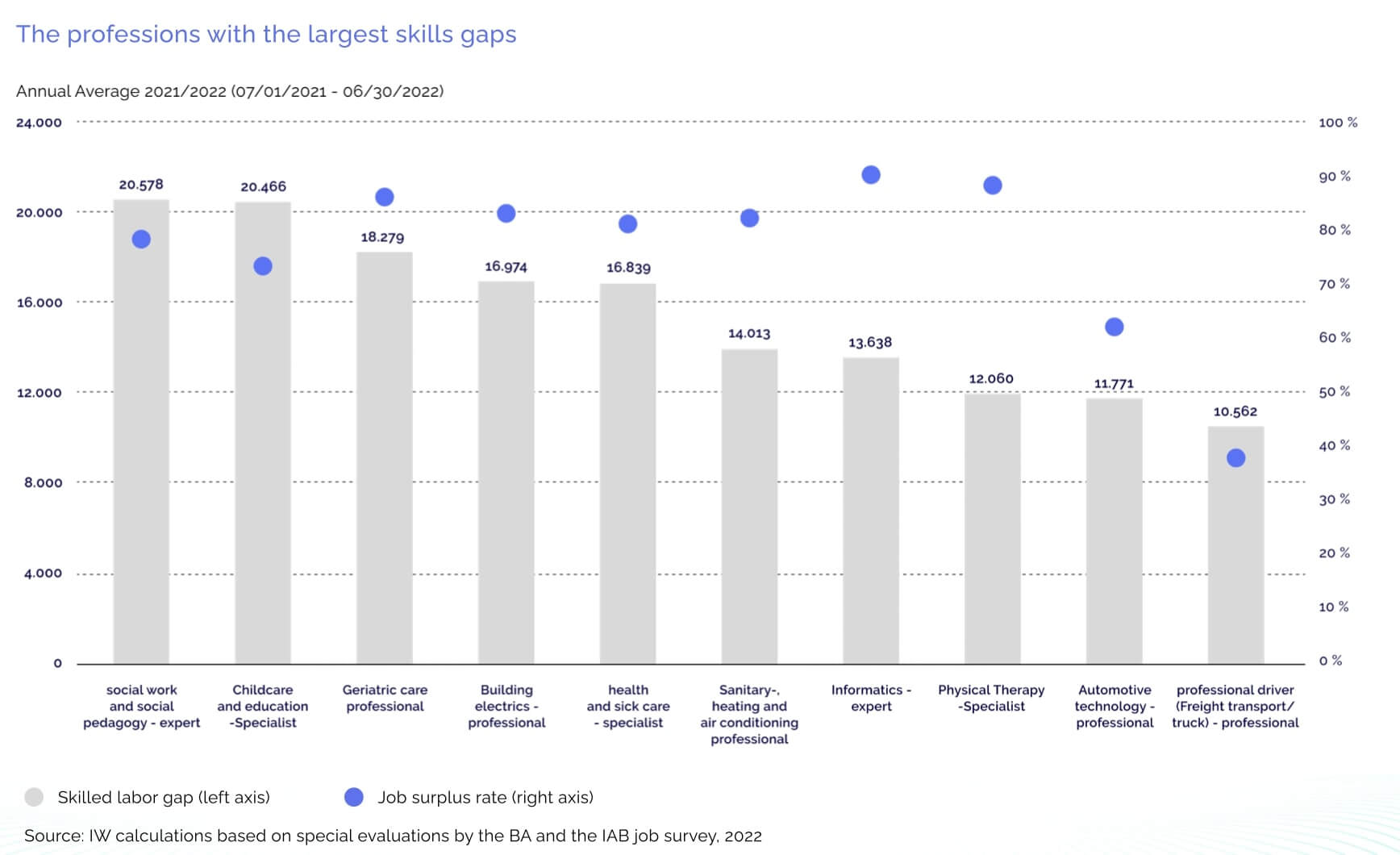Exploring the Future of Work
In today's rapidly evolving job market, the skills shortage has emerged as a pressing concern for businesses and economies worldwide. This issue, characterized by a mismatch between the skills employers need and those available in the workforce, poses significant challenges for growth, innovation, and competitiveness.
However, there's a beacon of hope: further education.
By investing in continuous learning and upskilling, we can bridge this gap, ensuring that individuals are equipped with the relevant skills for the jobs of today and tomorrow.
Recognizing the importance of further education not only solves the skills shortage but also paves the way for a more resilient and dynamic workforce.
What is a Skills Shortage
A skills shortage refers to a situation where there are more open positions for skilled workers than there are individuals with the necessary qualifications to fill them. Skilled workers are those who have undergone recognized academic or vocational training.  The phenomenon can be widespread, affecting an entire economy, or specific to certain sectors. Interestingly, a skills shortage can coexist with unemployment, often due to a mismatch where job seekers' qualifications don't align with employers' needs.
The phenomenon can be widespread, affecting an entire economy, or specific to certain sectors. Interestingly, a skills shortage can coexist with unemployment, often due to a mismatch where job seekers' qualifications don't align with employers' needs.
In Germany, sectors like Mathematics, IT, Natural Sciences, and Technology (often referred to as the MINT sector) along with the health and social domains are facing significant challenges due to a lack of skilled workers.
Even though Germany boasted a record employment figure of 41.741 million in 2022, numerous job openings persist, highlighting the complex dimensions of the skilled worker in Germany.
Reasons for a shortage of skilled workers
A lack of skilled workers can either impact the whole economy or just specific industries. Interestingly, this shortage can happen even when many people are jobless. This often arises when what job hunters offer doesn't align with what companies need, leading to what's commonly called a "mismatch."
Having a strong base of trained workers is essential for a lasting and thriving economy. The Federal Employment Agency points out that there are different signs of this shortage. For example, if jobs stay open for a long time or if salaries rise more than usual, it suggests that companies are struggling to find or keep their skilled staff. Over the years, businesses have felt the pinch of this shortage, making it harder for them to grow and evolve.
From a business standpoint, the challenge of finding skilled workers has grown significantly over recent years. Several factors contribute to this:
- Changing Labor Market: Shifts in job types and industries have reshaped the demand for certain skills.
- Demographic Trends: Aging populations and changing workforce demographics influence the availability of skilled workers.
- Working Conditions: If not favorable, they can deter potential employees from joining or staying in certain sectors.
- Impact of the coronavirus pandemic: The pandemic disrupted many industries, leading to shifts in job demand and availability.
- Digitalization: The rise of technology requires new skill sets, and not all workers have caught up.
- Education Policy: How nations educate their citizens can either bridge or widen the skills gap.
- Globalization: As businesses expand globally, the hunt for talent becomes a worldwide endeavor, intensifying competition.
Consequences of Skilled Labor Shortages
Surveys show that a vast majority of German companies, about 84%, anticipate significant impacts from a prolonged skills shortage, which could hinder their ability to complete tasks and orders. Achim Derck, a key figure at the German Chamber of Industry and Commerce, estimates this shortage could slash value creation by around 90 billion euros, roughly 2.5% of the GDP.
This looming crisis poses a threat to small and medium-sized businesses, which might struggle to attract talent due to limited resources. As the shortage intensifies, employees face increased workloads, potentially leading to burnout and further worsening the issue. To stay competitive, companies must prioritize enhancing their appeal to potential hires, especially given the varying demands across different generations.
Countermeasures to Skill Shortages
To combat the challenges posed by the skills shortage, companies must adopt a multifaceted approach.
Countermeasures to address this pressing issue include:
1- Modernizing Recruitment
"It is not the strongest of the species that survives, nor the most intelligent; it is the one most adaptable to change."
-Charles Darwin
In today's competitive job market, companies must proactively attract potential employees by offering compelling job descriptions, a strong employer brand, and a streamlined application process. Charles Darwin's principle of adaptability is especially relevant in the face of skills shortages, emphasizing the need for companies to be agile in their recruitment strategies.
Quick response times and a positive application experience are also key factors in not only attracting but also retaining top talent.

2- Enhancing Employee Retention
Enhancing employee retention is crucial, especially during skills shortages when attracting new talent becomes a challenge. Strengthening employee loyalty involves a holistic approach that goes beyond superficial perks, focusing on positive leadership, work-life balance, opportunities for growth, and a meaningful work environment.
High loyalty not only boosts employee commitment and productivity but also turns employees into ambassadors who can attract new hires.
3- Employer Branding
Establishing a strong employer brand is essential for attracting new talent and retaining current employees. A successful branding strategy should be authentic, reflecting the company's values and culture, and should start as early as the student level to build long-term relationships.
Effective communication of both monetary and non-monetary benefits, such as growth opportunities and work-life balance, can make employees proud brand ambassadors, further aiding in talent attraction.
4- Expanding Education
In-company training, particularly dual education, serves as a sustainable solution to the skills shortage. Offering internships, holiday jobs, and part-time positions to young people can foster early loyalty to the company.
Treating interns as valuable resources and giving them early responsibilities can encourage them to opt for apprenticeships, thereby securing future skilled workers for the company.
5- Talent Development
Recognizing and promoting employee potential is crucial for talent development. Many companies overlook the untapped talents within their workforce, often seeking external candidates for new roles.
However, through targeted talent programs and training, companies can identify and nurture internal talents, focusing on the competencies needed for specific roles, thereby preparing them for future leadership positions.
6- Strategic Personnel Development
Strategic personnel development is crucial for equipping all employees with the skills needed for current and future challenges. The focus is on lifelong learning and creating customized training programs that are aligned with the company's business goals.
This approach not only maintains competitiveness but also taps into the untapped potential of the workforce.
7- Digitalization and Automation
Digitalization and automation can significantly reduce the demand for skilled workers by streamlining processes and improving operational safety.
For instance, the logistics industry uses robots to handle tasks traditionally done by human workers, saving on personnel costs and increasing efficiency. This allows employees to focus on tasks that can't be easily automated, optimizing the workforce.
8- Business Processes
To adapt to the skills shortage, companies can implement digital solutions like automation to handle repetitive tasks, thereby freeing up employees for more complex work.
Flexible work schedules and remote work options can also make the company more appealing to potential hires. In industries like hospitality, leveraging online platforms for orders and deliveries allows businesses to focus on core tasks, such as food preparation, while reducing the need for additional staff.
9- Securing Skilled Workers through Immigration
To address the skills shortage, companies are increasingly looking beyond domestic talent pools and recruiting skilled workers from abroad. Surveys show that one in three companies has hired international talent, with 70% of these companies offering language and qualification support to aid in both workplace and societal integration.
Additionally, a growing number of companies are expressing interest in recruiting from non-EU countries, signaling that international recruitment is becoming a key strategy in tackling the skilled worker shortage.
In summary, addressing the skill shortage requires a multifaceted approach, from modern recruitment strategies and employee retention efforts to embracing technological advancements and looking beyond borders for talent.

Tectrain's Research on the Topic of Skill Shortage
Employee Retention Research by Clara Brinkmann
The study delves into the intricate dynamics of employee retention in today's competitive job market. With the challenge of retaining a vibrant and evolving workforce, the research seeks to understand the varying expectations and motivations across different generations.
Using a blend of scientific data and hands-on findings, the study examines the desires of various age groups, emphasizing that one-size-fits-all solutions from literature might not always be apt. With a sample size of 100 participants spanning diverse age brackets, the research aims to offer companies insights into what truly drives each generation, from work-life balance desires to intrinsic motivations.
The results of the study highlight a significant shift in workplace priorities. Gone are the days when simple perks like free coffee could entice employees. Today's workforce, irrespective of their age, seeks a harmonious balance between their professional and personal lives, flexible work schedules, and continuous learning opportunities.
Merely offering a competitive salary isn't the golden ticket anymore. Instead, fostering a dynamic company culture, providing meaningful feedback, and ensuring avenues for growth are essential. Furthermore, the COVID-19 pandemic has amplified these expectations, reshaping the job market and emphasizing the need for employers to adapt swiftly to these evolving demands.
The Role of Further Education
Continuous learning and upskilling have become paramount in today's fast-paced world. As industries evolve and technologies advance, the skills required to thrive in various professions undergo constant change. Traditional education, while foundational, often falls short of equipping individuals with the dynamic skills needed for the modern workplace.
By emphasizing continuous learning and upskilling, individuals can stay updated on the latest developments, ensuring they remain relevant and valuable in their respective fields. This proactive approach to education effectively bridges the skills gap, ensuring that the workforce is always prepared for the challenges of the present and the opportunities of the future.
On the ground, numerous businesses have already reaped the benefits of further education initiatives. For instance, tech giants like Google and Microsoft offer extensive training programs for their employees, ensuring they're equipped with the latest skills in the ever-evolving tech landscape. Similarly, companies like Siemens have established dedicated training centers to upskill their workforce in advanced manufacturing techniques.
These real-world examples underscore the tangible benefits of further education: enhanced productivity, increased innovation, and a competitive edge in the global market. By investing in their employees' education, these businesses not only address the immediate skills shortage but also lay the groundwork for long-term success.
Bridging the IT Skills Gap
The Information Technology (IT) sector is a prime example of an industry that's perpetually in flux. With the rapid advancements in technology, from cloud computing to artificial intelligence, the demand for specialized skills has skyrocketed. However, the supply of professionals equipped with these cutting-edge skills hasn't kept pace, leading to a pronounced IT skills shortage.
For instance, cybersecurity, a field that has gained immense importance due to the increasing number of cyber threats, faces a significant talent crunch. Similarly, the rise of data science and machine learning has created a surge in demand for experts in these domains, but there aren't enough trained professionals to fill these roles.
This widening gap between demand and supply in the IT sector poses a dual challenge: companies struggle to find the right talent, and professionals face the risk of becoming obsolete if they don't continuously upgrade their skills.
Recognizing the critical nature of this skills gap, tectrain offers a suite of courses and training programs tailored to the IT industry. Whether you're looking to delve into the nuances of cloud architecture or get certified in the latest cybersecurity protocols, tectrain has a course designed for you.
Their programs are not just about theory; they emphasize hands-on experience, ensuring that learners are industry-ready. By partnering with tectrain, both individuals and businesses can ensure they're at the forefront of the IT revolution, fully equipped to tackle the challenges of today and tomorrow.
Featured Resources
9 Must-Have IT Training Courses
TOP 5 Software Architecture Certifications For Your Career
Tackling the IT Skills Shortage: The tectrain way
In today's fast-paced digital era, the IT sector stands at the forefront of innovation and progress. However, with rapid advancements comes the challenge of a growing skills shortage. Companies are in a race to secure top talent, but the demand often outweighs the supply. This imbalance poses a significant threat to the industry's growth and sustainability.
But what if a solution exists to bridge this gap? Introducing tectrain, with its comprehensive approach to tackling the IT skills shortage.
Recognizing and Nurturing In-House Talent
One of the primary reasons companies face a talent crunch is the oversight of potential within their own ranks. Many businesses are quick to scout the external job market, overlooking the dormant talents of their existing employees.
Tectrain emphasizes the importance of internal talent development. Through targeted programs and training opportunities, tectrain aids companies in identifying and nurturing their in-house talents, preparing them for future leadership roles and specialized IT positions.
Strategic Personnel Development for the Future
The IT landscape is ever-evolving, and so should be the skills of the professionals navigating it. Tectrain understands that rote learning is not the answer. Instead, the focus should be on practical, self-determined, and sustainable competence development.
Whether it's online or in-person IT training, tectrain's programs are designed to foster sustainable competence development, ensuring that employees are not just equipped with knowledge but also the skills to apply it effectively.
Harnessing the Power of Digitalization and Automation
While human expertise is irreplaceable, certain repetitive tasks can be automated for efficiency. Tectrain offers solutions that help companies streamline their operations through digitalization and automation.
For instance, in sectors like logistics, where robots are increasingly being used, tectrain provides the necessary training and tools to ensure seamless integration. This not only reduces the demand for skilled workers but also ensures operational safety and efficiency.
Optimizing Business Processes
In the face of a skills shortage, it's imperative for companies to adapt their business processes. Tectrain assists businesses in introducing flexible work models, promoting remote working options, and leveraging digital platforms to alleviate personnel pressure.
By doing so, companies can focus on their core IT tasks, ensuring quality output while also making their work environment more attractive to potential IT talents.
Tectrain's Offers and Services for IT Skills Shortage
In the rapidly changing landscape of the IT industry, tectrain stands as a beacon for businesses seeking to navigate the challenges of the skills shortage. Here's how tectrain's offerings can make a difference:
At the heart of tectrain's mission is the commitment to nurturing talent. Through programs like the iSAQB ® , tectrain ensures that individuals are equipped with the skills they need to excel in the IT world. This focus on talent development ensures that businesses have access to a pool of skilled professionals ready to drive innovation.
Tectrain's expertise in agile methodologies ensures that businesses remain nimble and adaptive. By embracing the agile approach, companies can swiftly respond to evolving market demands and ensure that they're always a step ahead. Tectrain's SAFe® Training and Domain Driven Design courses are prime examples of how they equip professionals with agile skills.
In addition to these core offerings, tectrain academy provides a plethora of courses, seminars, and training programs in areas like iSAQB®, SAFe®, SCRUM™, ITIL®, UXQB®, and IREB®, ensuring that businesses and professionals have access to top-tier education and training resources.
Conclusion
The skills shortage remains one of the most pressing challenges in today's business landscape. As industries evolve and the demands of the modern workplace change, the need for continuous learning and upskilling becomes even more paramount.
Further education is not just a luxury; it's a necessity for businesses aiming to stay competitive and relevant. By investing in continuous learning, companies can bridge the skills gap, ensuring they have a workforce that's equipped to meet the challenges of today and tomorrow.
Now, more than ever, businesses must take proactive steps to address this issue. Partnering with experts like tectrain offers a strategic advantage, providing access to top-tier training programs and insights that can drive real change.
It's time for businesses to recognize the value of continuous learning and make it a cornerstone of their growth strategy. The future belongs to those who are prepared, and with tectrain by your side, you'll be more than ready to face it.









